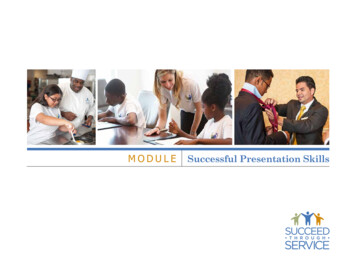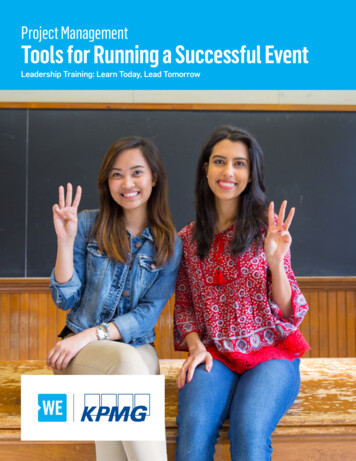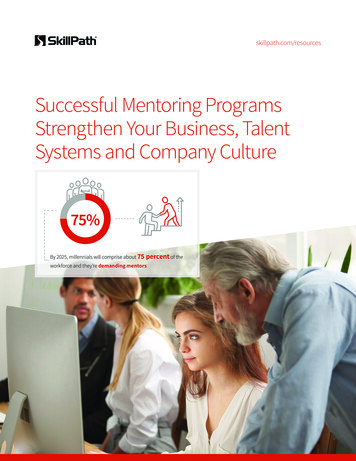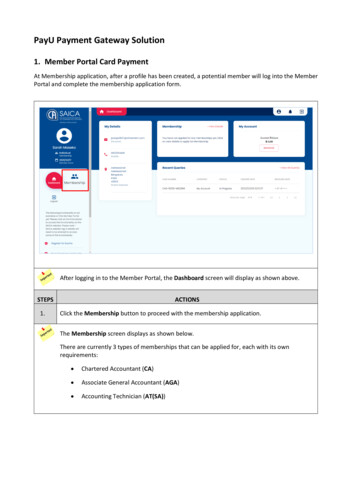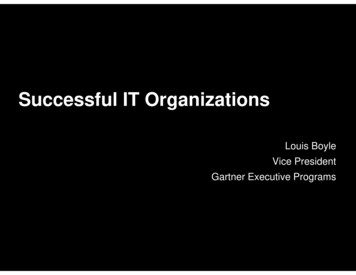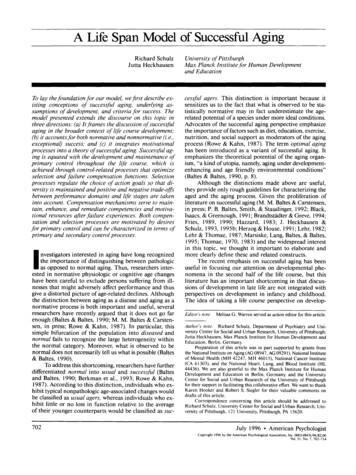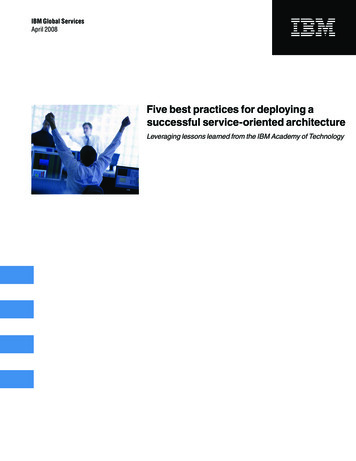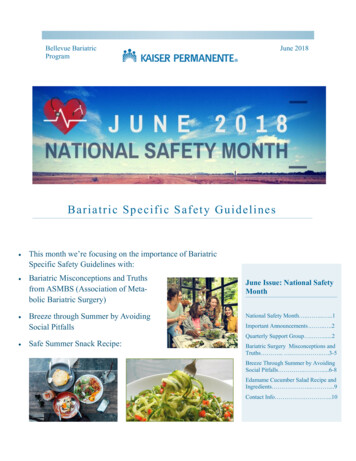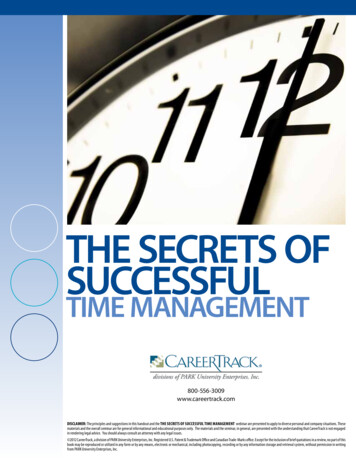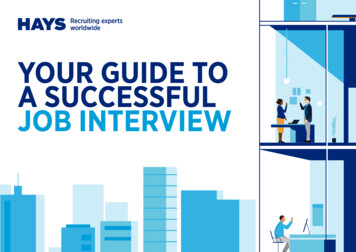
Transcription
YOUR GUIDE TOA SUCCESSFULJOB INTERVIEWHays Interview Guide1
WHAT’S INSIDE?Welcome to your Interview Guide! Here you will find all the tips and advice you need to guide you through your next job interview and ensure it’s asuccess - whether it’s taking place in-person, over video or phone.PART 1:YOUR PRE-INTERVIEWTO DO LISTHays Interview Guide - What’s inside?PART 2:WHAT TO DO ON THE DAYOF YOUR INTERVIEWPART 3:AFTER YOUR INTERVIEW –WHAT’S NEXT?2
PART 1YOUR PREINTERVIEWTO DO LIST
DO YOUR RESEARCHIn order to get yourself interview-ready, you need to research and speak to your recruiter about these four things:1. THE INDUSTRYWHAT DO I NEEDTO KNOW?WHERE CAN I FINDTHIS INFORMATION?About any recent developments, trendsand changesSearch engines, news stories and companywebsites3. THE HIRING MANAGER2. THE COMPANYWHAT DO I NEEDTO KNOW?Its history, its products and services,its mission, its values and purpose, itscustomers and its cultureWHERE CAN I FINDTHIS INFORMATION?Their company websites, annual reports,marketing material, company social mediaaccounts, employee social media activity,news stories, events and review sites4. THE ROLEWHAT DO I NEEDTO KNOW?Who they are, what their role is, what theirexpertise is, and their past experienceWHAT DO I NEEDTO KNOW?As much as possible about this roleand any previous work the teamhas completedWHERE CAN I FINDTHIS INFORMATION?Their LinkedIn profile, search engines, thecompany websites, speaking appearances (trysearching YouTube), and ask your recruiterWHERE CAN I FINDTHIS INFORMATION?The job description, company socialmedia accounts, employee social mediaactivity and company websitesHays Interview Guide - Pre-interview to do list4
PLAN HOW YOU ARE GOING TO INTRODUCE YOURSELFA key part of getting ready for your interview is preparing how you will introduce yourself and talk through your ‘story’ so far.So, how should you structure your introduction?1THINGS TO REMEMBER:Firstly, explain your relevanteducational andprofessional backgroundI am a business management graduate with a master’sin Digital Marketing. Since leaving university I haveenjoyed a two year marketing career within thesports industry.When talking through your CV, ensure you doso in chronological order – focusing on only theroles which are relevant to this job interviewKeep your language simple, and where possible,use action verbs to better showcase your skills23Next, discuss the key skills andexpertise you have which directlyrelate to this opportunity, usingmeasurable examplesFinally, describe what you arelooking for in your next role andwhy this role, at this organisation,appealed to youHays Interview Guide - Pre-interview to do listDuring my time within this industry, I have been ableto apply what I learnt during my master’s, whilstbuilding upon my digital marketing expertise evenfurther. I believe that my digital marketing skills are bestshowcased by an email marketing campaign I recentlyled, which increased our conversion rate by 10 per cent.You can find more information about introducingyourself in a job interview here.My previous organisation has helped me develop thedigital skills I have today, however, I believe that for thesake of progressing my expertise further, it’s time tomove on. Therefore, I’m looking for a more challengingrole within a fast-paced global organisation, wherethere is plenty of room for me to grow as a marketingprofessional; hence why I was so pleased to be invitedto interview for this role.5
PRACTISE INTRODUCING YOURSELF1. YOUR RELEVANT EDUCATIONAL ANDPROFESSIONAL BACKGROUNDHays Interview Guide - Practice 12. THE KEY SKILLS AND EXPERTISE YOU HAVEWHICH DIRECTLY RELATE TO THIS OPPORTUNITYTip: use measurable examples3. WHAT YOU ARE LOOKINGFOR IN YOUR NEXT ROLE ANDWHY THIS ROLE, AT THIS ORGANISATION,APPEALED TO YOU66
PREPARE YOUR ANSWERS TO THESE COMMONINTERVIEW QUESTIONSOnce you’ve introduced yourself and spoken through your CV, you will likely be asked some common interview questions.Here are some that you should prepare for:1. “WHY ARE YOU LOOKING TOLEAVE YOUR CURRENT JOB?”The interviewer will ask you this because they wantto understand what motivates and fulfils you, andwhat type of company culture you are bestsuited toDon’t focus this answer on what you dislike aboutyour current role or organisation; focus on theopportunities that you see in the position you’veapplied for – such as the opportunity to learnnew skills, or develop your understanding in anew industryFor example:“While I’ve learnt a great deal inmy current role, I believe it is now time to makea change, because I’d like to expand on myskills, and build on my experiences on a moreconsistent basis. I believe this opportunity mayenable me to do that, as I’ve found from myresearch that your company has a commitmentto lifelong learning for your staff.”Find more advice on answering this question here.Hays Interview Guide - Pre-interview to do list2. “WHY SHOULD I HIRE YOU?”3. “HOW WOULD YOUR FRIENDSDESCRIBE YOU?”This is an opportunity to sell yourself; think aboutwhat benefits you will bring to the company if theytake you on, rather than someone elseBy asking this question, the interviewer is trying todetermine if your personality suits the role, teamand companyIdentify three skills/experiences you’re goingto mention. This list should include ‘hard skills’mentioned in the job description (i.e. technicalabilities), as well as transferrable or ‘soft skills’,like communication and the ability to work aspart of a teamWhat kind of personal attributes of yours wouldbe useful for demonstrating your suitability for thisrole?Be informative, but succinct. Don’t risk disengagingthe interviewer with an overly long and poorlystructured responseRehearse, but also maintain some spontaneity. Besure not to over-rehearse your response to suchan extent that you come across as robotic whenyou give itFind more advice on answering this question here.For example:You might be interviewing for a sales role, and youthink your friends would describe you as friendlyand a good listener. These would be goodqualities to mention, as they demonstrate yourability to build rapport, including with potentialand existing clients.Don’t just think about traits that relate to the jobdescription, think about how your friends wouldtruly describe you – or better, ask them. This willindicate to the interviewer how well you will get onwith your potential colleaguesFind more advice on answering this question here.7
PREPARE YOUR ANSWERS TO THESE COMMONINTERVIEW QUESTIONS4. “WHY DO YOU WANTTHIS JOB?”Structure your answer with these four key points:1. Why you are passionate about the company2. Why you are passionate about the role3. How this opportunity would allow you to progress5. “CAN YOU TELL ME ABOUT ATIME THAT YOU FAILED?”6. “WHAT ARE YOUR SALARYEXPECTATIONS?”This will help the interviewer to assess how you dealwith set-backs; do you take a step back and thinkabout where you went wrong, or do you sweep itunder the carpet and act like it never happened?Make sure you are aware of the industry standard foryour role and level of experience before going intoyour interview. If you’re unsure, consult our SalaryGuides or ask your recruiterPlan which example you are going to talk about –not something which is a thinly veiled success story,but is a genuine example of where you made anoversight or error in judgementHaving this information will allow you to answer thisquestion with a lot more conviction, and willput you in a much better position should youneed to negotiate4. Reiterate how pleased you are to have beeninvited to the interviewFind more advice on answering this question here.7. “ARE YOU INTERVIEWING WITH ANYOTHER COMPANIES?”The interviewer will ask you this for a range ofreasons, whether that’s to gain validation thatyou are genuinely interested in this role and theircompany, or to see how quickly they would need toact if they were to offer you the job.Some key points to remember: explain clearly how ithappened, don’t make excuses, don’t blame othersand show that you have learnt from the situationFind more advice on answering this question here.Find more advice on answering this question here.Do:Don’t:Convey that this is your company ofchoice; pivot the conversation towardswhat you are looking for in your nextrole; keep it general; don’t hide thefact you’ve already received a joboffer if that’s the case.List specific company names or thenumber of other jobs you’ve applied for,and don’t exaggerate the scale of yourjob search or progress so far.Find more advice on answering this question here.Hays Interview Guide - Pre-interview to do list8
PRACTISE YOUR ANSWERS TO THESECOMMON INTERVIEW QUESTIONS1. “WHY ARE YOU LOOKING TOLEAVE YOUR CURRENT JOB?”Hays Interview Guide - Practice 22. “WHY SHOULD I HIRE YOU?”3. “HOW WOULD YOUR FRIENDSDESCRIBE YOU?”99
PRACTISE YOUR ANSWERS TO THESECOMMON INTERVIEW QUESTIONS4. “WHY DO YOUWANT THIS JOB?"5. “CAN YOU TELL ME ABOUTA TIME THAT YOU FAILED?”6. “WHAT ARE YOURSALARY EXPECTATIONS?”7. “ARE YOUINTERVIEWING WITH ANYOTHER COMPANIES?”Hays Interview Guide - Practice 21010
LEARN HOW TO USE THE STAR TECHNIQUE FORSITUATIONAL INTERVIEW QUESTIONSYou may also be asked situational andbehavioural interview questions that areabout understanding how you work, andwhat your innate response to a particularsituation would be. For example:“Tell me about a time when yousupported a colleague who wasstruggling.”“Give me an example of a time thatyou missed a deadline. How did youlearn from it?”“Tell me about a time when you sawthat a colleague had made a mistake.What did you do?”In order to answer this type of interview question successfully, you need to use the storytelling method called the STAR technique. This will keep your responses clear, focusedand memorable. Let’s demonstrate this technique by using the example question “Can you think of a time where you used a problem-solving attitude?”SSET THE SITUATIONTDESCRIBE YOUR TASK AND INVOLVEMENTAYOUR ACTIONRHays Interview Guide - Pre-interview to do list“Yes, whilst I was employed at X company, I was responsible for digitally promoting a portfolio of X products. One week, ouronline sales for a particular product were 25 per cent lower than usual.”“I was tasked with making changes to our digital marketing presence to rectify this dip in sales.”“Therefore, I created banner adverts for these products to go on our homepage and email signatures. I also increased our socialmedia activity promoting these products. I encouraged internal teams to “like and share” this activity. I then launched an emailcampaign to go out to a targeted list of customers for that product.”SHOW OFF THE RESULTS“Consequently, by the following week, online sales for this product saw a 40 per cent increase and have remained steady eversince.”Learn more about the STAR technique here.11
PRACTISE THE STAR TECHNIQUE:ANSWER ONE OF THE QUESTIONS BELOW“Tell me about a time when you supported acolleague who was struggling.”S“Give me an example of a time thatyou missed a deadline. How did youlearn from it?”“Tell me about a time when you saw that acolleague had made a mistake. What didyou do?”SET THE SITUATIONTDESCRIBE YOUR TASKAND INVOLVEMENTAYOUR ACTIONRSHOW OFFTHE RESULTSHays Interview Guide - Practice 31212
BE READY TO EXPLAIN ANY GAPS ON YOUR CVEveryone is bound to have some sort of gap on their CV, whether that’s down to redundancy, travelling, illness, caring for a relative, looking afterchildren, studying, and so on.Whatever the circumstances, this is very common and explaining the gap in an interview doesn’t need to be a source for stress or worry.But how can you explain these gaps to an interviewer in a manner that further sells you as a potential hire?REMEMBER THESE FIVE GENERAL PRINCIPLES:1.When explaining howyou’ve spent your timeout of the workplace, tryto demonstrate anythingyou’ve done that has beenproductive or proactive –such as learning a new skill,keeping up to date with theindustry, or any voluntarywork you undertook.2.Structure your answer well.Briefly start by explainingwhy you were unemployedduring that time, then goon to explain what you did,and lastly emphasise whyyou think this is the rightopportunity for you.3.4.Rather than going intospecifics about the reasonfor your gap, focus youranswer on how you usedyour time and why youthink you would be greatin this role.Finance ManagerEmployment HistoryUse positive language anddon’t apologise for taking abreak or having a gap.CVVANESSA PLUMPersonal StatementWhatever the reason is,remember to be openand honest with youranswer, without going intounnecessary detail.5.Skills SummaryEducation & TrainingYou can learn more aboutexplaining CV gaps in aninterview by reading this blog.Hobbies & InterestsHays Interview Guide - Pre-interview to do list13AchievementsReferences
PLAN THE QUESTIONS YOU ARE GOING TO ASKTHE INTERVIEWERWhen you are asked “Do you have any questions?”, it’s important to use this as an opportunity not only to determine if this truly is the perfect jobrole, company and team for you, but to demonstrate your creative thinking, curious mindset and genuine interest to your potential employer.FOCUS YOUR QUESTIONS ON THESE SIX AREAS:1. THE ROLE4. LEARNING AND DEVELOPMENT How often would my performance bereviewed? What training opportunities are available?Is this a new role? If not, how has it evolved?Is there scope for career progression?What does success look like in this job?What does a typical day look like?2. THE TEAM5. THE ORGANISATION Can you tell me more about the team? How does the team fit into the overallstructure of the company? What constitutes success for the team? What are the main challenges andopportunities the business faces? How long do employees usually remainwith the business? How does your organisation live itspurpose?3. THE HIRING MANAGER What’s your background? From your perspective, what’s it like towork here? What is your management style?Hays Interview Guide - Pre-interview to do list6. NEXT STEPS What is the next step in the hiringprocess?14
PLAN THE QUESTIONS YOU’RE GOING TOASK THE INTERVIEWERTHE ROLE:LEARNING AND DEVELOPMENT:THE TEAM:THE ORGANISATION:THE HIRING MANAGER:NEXT STEPS:Hays Interview Guide - Practice 41515
YOU ARE ALMOST INTERVIEW-READY,WITH JUST A FEW FINAL PREPARATIONS LEFT Ensure you’re clear on these five practicalities:1WHAT TIME AND WHERETHE INTERVIEW WILLTAKE PLACEIf the interview is beingconducted at the organisation’soffice, ensure you know howto get there and how long itwill take.If the interview is beingconducted remotely, ensureyou’re clear on the technologyused – and plan where you willsit, thinking carefully aboutwhat you’d like your backgroundto be. Also ensure you informanyone you live with about theinterview, so as to avoid anynoise disruption.2345HOW LONG THEINTERVIEW WILL LASTWHAT FORMAT THEINTERVIEW WILL BEWHAT THE DRESSCODE ISTHE JOBDESCRIPTIONAs a general rule of thumb, aface-to-face interview will lastaround 45 minutes toone hour.Will it include tests, ormeeting the team?This is still important even ifthe interview is taking placeremotely.It’s a great idea to print this outto have with you, just in case.If your interview is face-to-face,you can have this in your bag forsome final preparations on yourway.If your interview is remote, youcan have this to hand so you canrefer to it at any point.If you’re feeling unsure aboutany of these points, yourrecruiter can help you.Hays Interview Guide - Pre-interview to do list1616
IF YOU NEED TO ARRANGE TIME OFF FOR YOURINTERVIEW, CONSIDER THESE THREE THINGS1. TRY TO AVOID SCHEDULING THEINTERVIEW DURING WORKINGHOURS, IF POSSIBLE First thing in the morning, during yourlunch break, or even after work are thepreferable times to arrange an interview If your interview is scheduled for a timethat could be particularly difficult for youto attend, let your recruiter or the hiringmanager know as early as possible Explain the situation and request somealternative dates and times2. BOOK A DAY’S ANNUAL LEAVE ON THEDAY OF THE INTERVIEW Or if that’s not possible, what about booking ahalf-day? This way, your anxieties will be significantlydiminished, allowing you to focus solely onyour interview3. DON’T LIE OR SNEAK AROUND If you have been unable to move theinterview to a time that fits aroundyour current work commitments,it can understandably be temptingto manufacture a mythical doctor’sappointment or even call in sick onthe day But we do not recommend this; it is avery difficult situation to be in, but it’snot worth getting caught out in a lie. Ifyou are at last resort, then it’s best to bevague and say that you have a personalappointment you must attendYou can find more advice onarranging time off for a jobinterview here.Hays Interview Guide - Pre-interview to do list17
GET INTO A POSITIVE FRAME OF MIND BEFOREYOUR JOB INTERVIEWThis will allow you to perform at your very best, in the knowledge that you’re as prepared as possible. It will also help you feel more confident,enabling you to really sell yourself and your skills in an authentic way to the interviewer.Follow these five steps in the days before your interview to get into a positive mindset, and to calm any nerves you may be feeling:1. REFRAME THE WAYYOU THINKCheck your language forphrases like “this is impossible”or “I can’t” and replace themwith positive affirmations, suchas “I can do this”.An interview is merely aconversation with someone toget to know each other and tofind out more about the job –there’s no need to build up thesituation and cause yourselfunnecessary stress or anxiety.Hays Interview Guide - Pre-interview to do list2. SPEAK TO YOURRECRUITER ANDSUPPORT GROUP3. DON’T LET IMPOSTERSYNDROME GET THEBETTER OF YOUDo you have a friend or familymember who is great at givingadvice, or calming you down?Give them a quick call forsome reassurance.Rather than telling yourselfthat your success to date hasjust been down to luck, remindyourself of your uniqueness andyour worth.Remember, too, that yourrecruiter is an expert, and cananswer questions aboutany worries or concerns youmay have.Take that self-belief into yourjob interview.4. PICTURE POSITIVEOUTCOMESNegative thinking can send thebest of us into a downwardspiral of anxiety, and this is notthe right mindset to be in beforean interview. Give yourself apep talk, believe in yourself andremember all that you haveachieved so far in your life andcareer.Now try to mentally visualisepositive outcomes, whetherthat’s building rapport with theinterviewer or delivering greatanswers that set you apart.5. CHANGE YOURPERCEPTION OF THEINTERVIEWERIt’s easy to be intimidated byan unknown, presumably seniorperson. But this doesn’t needto make you nervous; after all,if you’ve followed this guide’sadvice, you will have alreadylooked up your interviewer andfound out more about them.Realise that this person willhave also been in your shoesonce, so you don’t need to feelintimidated.18
LAST BUT NOT LEAST The evening before your interview is the time for you towind down and relax your mind. You’ve done all you canby way of interview preparation, so now you need toensure you go into the interview tomorrow witha fresh mind.THE NIGHT BEFORE YOUR INTERVIEW,YOU SHOULD: Make sure you have time to switch off fromyour preparation. You could do that byexercising, speaking to friends and family, orplanning an activity or hobby for the evening Eat a nutritious meal Stay calm and keep things in perspective – ifyou need to revisit the steps for maintaining apositive mindset then do Get a good night’s sleep – make sure you avoidany phone or computer screens in the lead upto going to sleep, and focus your attention onthings that calm you down and distract yourmind, such as reading or mindfulnessHays Interview Guide - Pre-interview to do list19
PART 2ON THE DAYOF YOUR JOBINTERVIEW
MAKE THE BEST FIRST IMPRESSION POSSIBLEIt’s essential that you are mindful of the fact that the second you step through the door – before even meeting your interviewer – you are alreadymaking your first impressions. So, on the day of your interview, ensure you:(TICK)1.Refresh your mind of the job description, your CV, and any key notesyou have made2.Be polite to everyone you meet – whilst receptionists and passingemployees will not be deciding if you get this job or not, they could playa factor. Be your true, authentic self when meeting anyone during yourinterview process3.For a face-to-face meeting, wait professionally in the reception areabefore you’re invited for your interview. Rather than scrolling throughyour phone, look around you. Are there posters that tell you moreabout the organisation? Or marketing materials like booklets that youcould flick through? This will not only help to illustrate your interest inthe company from the outset, but will also teach you more about theorganisation4.Arrive on time – being 10 minutes early is best. But if you’re runninglate because of factors outside of your control (like unexpected travelissues), then let your interviewer or recruiter know. Being on time isessential for a video interview too – while being early for this isn’tnecessary, be sure you are ready to go 10 minutes prior to the meetingAND FINALLY Switch off your phone Don’t chew gum Smile!HaysHays InterviewInterview GuideGuide - On the day of your interview2121
ENSURE YOU BUILD RAPPORT WITH YOUR INTERVIEWERBuild a meaningful connection with your interviewer by 1. SMILING5. STARTING YOUR ANSWERS WITH APOSITIVE AFFIRMATION OR AGREEMENTMake a conscious effort to smile when you are firstintroduced, when you say goodbye and regularlythroughout the interview. This might seem obvious now,but nerves could make you forget.Such as “great question”. This is another greatway to humanise the interaction between youand the interviewer.2. REMEMBERING YOURINTERVIEWER’S NAME6. ASKING FOLLOW UP QUESTIONSAgain, make this more of a conversation. If theinterviewer gives information you’re interested in whendelivering a question, once you have answered theirquestion, be sure to follow up and show your interest.Use it quite often during the interview and as you leave.This is a trick that politicians use when establishingrapport with journalists who interview them, and it’ssurprisingly effective!7. RELAXING, AND BEING THE REAL YOU3. BEING MINDFUL OF NON-VERBALCOMMUNICATIONEven the seemingly simplest things, like sittingup properly in your chair and maintaining goodeye contact, can make a big difference to both your ownmindset and how the interviewer perceives you.4. NOT INTERRUPTING THE INTERVIEWERWhilst it’s important to make the interview feel morelike a conversation than an interrogation, it’s importantyou are patient and ensure the interviewer has finishedspeaking before responding. If you’re interviewingremotely, be aware of any time lags due to technology.Don’t be afraid to let your personality shine through tohelp your interviewer see who you really are. Answerquestions honestly and clearly.TOP TIP FOR A REMOTE INTERVIEW:To appear as though you are providing eye contactduring a video interview, remember to occasionallylook into your camera while delivering youranswers and when receiving a question. That way,you will look engaged when listening, and you willbe more engaging when you are speaking.To find more advice on building rapport with yourinterviewer, read our blog.Hays Interview Guide - On the day of your interview22
WHAT TO DO IF YOUR MIND GOES BLANKDURING YOUR INTERVIEWSTAY CALM AND DON’T PANICThis is crucial. It’s important to know thatthe sense of dread and impending disasterwashing over you isn’t everything you fear itis. Staying calm will allow your mind to thinkmore rationally and logically, rather than beingin a panicked state of mind.TAKE A DEEP BREATHNot only will this give you a moment to collectyourself, a deep breath also sends a messageto your brain to calm down and relax. In a jobinterview, your brain has reacted to a situationit perceives as threatening, and you takinga deep breath is calmly sending it a politemessage, in response, that this timeit’s mistaken.ADMIT TO YOUR INTERVIEWERTHAT YOUR MIND HAS GONE BLANKThis shows honesty and humility, whilstgiving you the opportunity to move on. Itcould also help you to relax from the suddenfight or flight response and allow you to askthe interviewer to repeat the question.REPEAT THE QUESTION BACKTO THE INTERVIEWERThis gives you a moment to collect yourthoughts and listen to the question again inyour own voice, and for the interviewer toconfirm that you have heard the questioncorrectly.WHAT CAN YOU DO TO ENSURE THESEMIND BLANKS DON’T HAPPEN IN THEFIRST PLACE? Relax as much as possible, so that you can think logically Focus on listening to the question being asked, rather thanyour anxieties and worries in your head Don’t worry about moments of silence, they are normal inany conversation. Take your time Use gestures to help you in the retrieval of key informationHAVE A SIP OF WATERAt the start of a face-to-face interview ensureyou accept an offer for a drink, and similarlyif you are at home in a video interview makesure you have a drink nearby. This is becausewhen you’re faced with a tough question oryour mind goes blank, you can take a sip ofwater before answering. This will be a naturalpause in conversation, buying you somemore time to calm your mind and think ofyour answer.Hays Interview Guide - On the day of your interviewFor more advice on dealing withmind blanks, read this blog.23
PART 3WHAT TODO AFTERYOUR JOBINTERVIEW
NEXT STEPS – WHAT YOU SHOULD AND SHOULDN’T DOAFTER YOUR INTERVIEWWell done – your interview is now over! So, what’s next?While you’re waiting to hear back from your interviewer or recruiter, follow these dos and don’ts:DOTALK TO YOUR RECRUITERSTRAIGHT AFTER THEINTERVIEWFollowing on from your interview, speak to your recruiteras soon as possible and provide feedback on how youthink the interview went, whilst it is all still fresh inyour mind.Reiterate your enthusiasm for the role and how muchyou enjoyed meeting with the interviewer. This will berelayed to the company and will work in your favour.Ask the recruiter for feedback if they have this yet. Ifnot, then politely try to get an idea of when you canexpect to hear back.Hays Interview Guide - After your interviewFOLLOW UP WITHA THANK YOU EMAILIf you have been in direct contact with the interviewerat any point, send them a follow up email to thank themfor their time.GIVE YOUR REFERENCESA HEADS-UPYour references should be aware that they are beingused as a reference, but drop them a note to remindthem and ask them politely to keep an eye out. Ensureyou thank them after they have provided this.If you’ve not been in direct contact with the interviewer,then this thank you can be sent via your recruiter.Use this as an opportunity to reiterate your interest inthe role. You could even explain that upon meeting withthem and learning more about the opportunity, you areeven keener than before, and how you look forward tohearing from them.@25
DON’TCUT TIES WITHYOUR RECRUITERIf you are not successful followingthis interview, then don’t lose hopeand certainly don’t cut ties with yourrecruiter. Thank them for their supportso far, and get as much feedbackas you can as to why you weren’tsuccessful. Be sure to take this onboard ahead of your next interview.Your recruiter is a valuable ally tohave during your job search, and itis important that they get to knowyou and what you’re searching for inyour career. So, work on building aprofessional rapport with them, andconnect with them on LinkedIn.BE TOOOBVIOUSJust because a new opportunity is on thehorizon, that doesn’t mean you shouldclock off and let your performance dropwithin your current role. Ensure you aremindful of your focus and diligence.It is important to maintain both yourreputation and relationship with yourcurrent company. You don’t know howmuch longer you will be working there,and even if you are offered another role,you never know when you might needtheir help in the future – such as byproviding you with a good reference.LOSE TRACK OFWHO YOU HAVEINTERVIEWED WITHKeep a spreadsheet or list of the namesof the companies, hiring managers andjob titles which you have or plan tointerview with.Make sure this spreadsheet is up-to-dateso that you are clear where you are at inthe application process with each role,and always review that list before pickingup the phone or sending that email.CALL OFF THEJOB SEARCHHowever well this interview went, do notby any means cancel any other upcominginterviews you have scheduled fordifferent roles, or give up the job hunt onthis basis alone.Think about what is making you so keenfor this specific opportunity, and usethese key points to steer your search forsimilar roles.JOBSTAGE?For more advice on what you should and shouldn’t do after your interview, read our blog.Hays Interview Guide - After your interview26
ASK YOURSELF THESE FOUR QUESTIONSTO DECIDE IF THIS IS THE RIGHT JOB FOR YOU1DO YOU FEEL EXCITEDABOUT THE JOB? Now you have been to the interview andfound out more, can you honestly saythis opportunity would push you to yourfull potential? How does it fit in with the career planand objectives you first set out when youembarked upon your job search? How did you feel when the interviewerwas explaining the role in more detail;did you feel excited, and like this is thechallenge you have been waiting for? Didyou find yourself asking more questionsabout the opportunity?2IS THE COMPANYRIGHT FOR YOU? How did you feel about their purpose,values and culture? Would you feel proud and passionateabout working there? Does their company “personality”suit your personality? What were your first impressionsof potential colleagues (if you wereintroduced to them)? Does this new role have what yourcurrent o
Find more advice on answering this question here. Find more advice on answering this question here. Find more advice on answering this question here. For example: "While I've learnt a great deal in my current role, I believe it is now time to make a change, because I'd like to expand on my skills, and build on my experiences on a more

